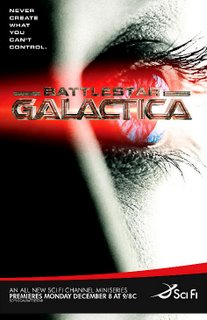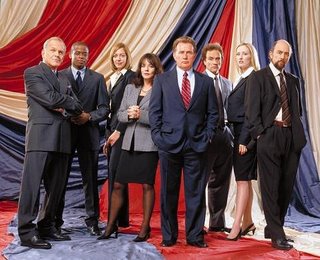DVDFanatic.com TV Archive
For the past year or so, I have been writing film and TV reviews at DVDFanatic.com. Here are synopsis' and links to those reviews.
BATTLESTAR GALACTICA--SEASON ONE

When I first saw the previews for the new Battlestar Galactica miniseries in 2003, I thought the show looked abominable. The Cylons of my childhood, with their shimmering chrome and flashing red eyes, had been replaced by cyborgs that looked just like humans. How menacing was that? Worse, they all seemed to be sexpots, copulating all over the ship. I’m not saying the original series was an undisputed classic or anything, but it deserved better than this sacrilegious remake.
And so it was that I found the word “blasphemy” forming on my lips, when my father, the man who weaned me on the glory, majesty and preeminence that is Star Trek, told me that Battlestar Galactica was superior in nearly every way.
He could not have been more right.
Battlestar Galactica is easily the best science fiction show to hit TV since Star Trek: The Next Generation (for the X-Files fans, I am willing to argue the point). This series is far better than anything the Roddenberry universe has put out in well over a decade. Series creator, Ronald Moore, who was one of Star Trek: The Next Generation and Deep Space Nine’s creative giants, has at least equaled the genius of his earlier work, if not, at times, surpassed it.
I don’t say that lightly. If you only knew how big a Star Trek fan I am…
Be warned—this is not your parents’ Battlestar. Gone is the fun, the camp and the escapism. This series is mercilessly dark, surprisingly violent, consistently intelligent, astonishingly spiritual and shockingly erotic, a complex and provocative drama that is steeped in relevant contemporary issues and shot through with a kind of riveting, feral tension.
Here, there are no aliens on exotic planets; here, there is only a handful of rag-tag human survivors, a massively overwhelming Cylon fleet and the vastness of cold space in between. This is a show about human beings on the cusp of extinction, fleeing into deep space from an unrelenting cybernetic foe they created to service themselves but who, in a coup de gras of which Milton would have approved, have rebelled and begun annihilating their masters.
Battlestar Galactica isn’t a science-fiction series so much as a drama for grown-ups that happens to take place in a science-fiction setting. This mature intelligence, one of the series’ greatest assets, is seen nowhere better than in the stately performances by its two lead actors: Galactica's militarily principled Commander Adama (Edward James Olmos) and the politically astute but physically deteriorating Colonial President Roslin (Mary McDonnell). Melded by a tenuous alliance, they attempt to lead the shattered human race, consisting of such inestimable ensemble characters as ace Viper pilot “Apollo” (Adama’s son Lee, played by Jamie Bamber), the brazenly insubordinate Starbuck (Katee Sackhoff) and Dr. Gaius Baltar (James Callis) whose every thought is monitored by omniscient Cylon ubervixen, Number Six (Tricia Helfer).
How far will humanity go to save itself? What responsibility do they have in their own extermination? At what point does technology move from a blessing to a curse? What responsibility does the creator have to his creation? What if your God is also the God of your enemies? What place has law and order when every day is little better than every man for himself?
Relying on its finely nuanced performances, solid direction, and gratifying personal and political drama to build its muscular emotional foundation, the first season, which picks up where the miniseries left off easily shows why it is the SciFi Channel’s highest rated drama series.
To read the full review, click here.
THE WEST WING--SEASON FIVE

The West Wing, one of the most literate, compelling dramas on television found its locomotive stride broken season five as the show’s uber-creator Aaron Sorkin and producer Thomas Schlamme bowed out. Reeling from the loss of Sorkin’s creative genius, white-hot wit and machine-gun rapid dialogue, the show scrambled to find its footing.
The spiral in quality did not escape the fans. Loyal viewers watched as the show’s usual sophistication and humor took a nose dive. New producer John Wells did his best to shore up the imaginative hemorrhage, but he simply could not duplicate the multiple Emmy-winning drama’s riveting power and urbane intelligence. Reduced to shock tactics and sensational story-lines, The West Wing’s decline looked to be both prolonged and inevitable.
Such was Season Five.
As I write this, The West Wing is half way through its seventh season. And it has done something many, including myself, did not think possible—it has rediscovered its soul. And what a great, broad, and deep soul it is. The West Wing has not simply been good this season (and season six to be honest), it has been great. It is once again television at its most inspired. With its usual luminous cast, engrossing storylines and wonderful guest stars in place (Jimmy Smits, Alan Alda), The West Wing is once again on top and is drawing lavish critical praise.
To read the full review, click here.
Other reviews:
The Waltons
Battlestar Galactica 2.0
The Peter Jennings Collection
Journalists Killed in the Line of Duty
BATTLESTAR GALACTICA--SEASON ONE

When I first saw the previews for the new Battlestar Galactica miniseries in 2003, I thought the show looked abominable. The Cylons of my childhood, with their shimmering chrome and flashing red eyes, had been replaced by cyborgs that looked just like humans. How menacing was that? Worse, they all seemed to be sexpots, copulating all over the ship. I’m not saying the original series was an undisputed classic or anything, but it deserved better than this sacrilegious remake.
And so it was that I found the word “blasphemy” forming on my lips, when my father, the man who weaned me on the glory, majesty and preeminence that is Star Trek, told me that Battlestar Galactica was superior in nearly every way.
He could not have been more right.
Battlestar Galactica is easily the best science fiction show to hit TV since Star Trek: The Next Generation (for the X-Files fans, I am willing to argue the point). This series is far better than anything the Roddenberry universe has put out in well over a decade. Series creator, Ronald Moore, who was one of Star Trek: The Next Generation and Deep Space Nine’s creative giants, has at least equaled the genius of his earlier work, if not, at times, surpassed it.
I don’t say that lightly. If you only knew how big a Star Trek fan I am…
Be warned—this is not your parents’ Battlestar. Gone is the fun, the camp and the escapism. This series is mercilessly dark, surprisingly violent, consistently intelligent, astonishingly spiritual and shockingly erotic, a complex and provocative drama that is steeped in relevant contemporary issues and shot through with a kind of riveting, feral tension.
Here, there are no aliens on exotic planets; here, there is only a handful of rag-tag human survivors, a massively overwhelming Cylon fleet and the vastness of cold space in between. This is a show about human beings on the cusp of extinction, fleeing into deep space from an unrelenting cybernetic foe they created to service themselves but who, in a coup de gras of which Milton would have approved, have rebelled and begun annihilating their masters.
Battlestar Galactica isn’t a science-fiction series so much as a drama for grown-ups that happens to take place in a science-fiction setting. This mature intelligence, one of the series’ greatest assets, is seen nowhere better than in the stately performances by its two lead actors: Galactica's militarily principled Commander Adama (Edward James Olmos) and the politically astute but physically deteriorating Colonial President Roslin (Mary McDonnell). Melded by a tenuous alliance, they attempt to lead the shattered human race, consisting of such inestimable ensemble characters as ace Viper pilot “Apollo” (Adama’s son Lee, played by Jamie Bamber), the brazenly insubordinate Starbuck (Katee Sackhoff) and Dr. Gaius Baltar (James Callis) whose every thought is monitored by omniscient Cylon ubervixen, Number Six (Tricia Helfer).
How far will humanity go to save itself? What responsibility do they have in their own extermination? At what point does technology move from a blessing to a curse? What responsibility does the creator have to his creation? What if your God is also the God of your enemies? What place has law and order when every day is little better than every man for himself?
Relying on its finely nuanced performances, solid direction, and gratifying personal and political drama to build its muscular emotional foundation, the first season, which picks up where the miniseries left off easily shows why it is the SciFi Channel’s highest rated drama series.
To read the full review, click here.
THE WEST WING--SEASON FIVE

The West Wing, one of the most literate, compelling dramas on television found its locomotive stride broken season five as the show’s uber-creator Aaron Sorkin and producer Thomas Schlamme bowed out. Reeling from the loss of Sorkin’s creative genius, white-hot wit and machine-gun rapid dialogue, the show scrambled to find its footing.
The spiral in quality did not escape the fans. Loyal viewers watched as the show’s usual sophistication and humor took a nose dive. New producer John Wells did his best to shore up the imaginative hemorrhage, but he simply could not duplicate the multiple Emmy-winning drama’s riveting power and urbane intelligence. Reduced to shock tactics and sensational story-lines, The West Wing’s decline looked to be both prolonged and inevitable.
Such was Season Five.
As I write this, The West Wing is half way through its seventh season. And it has done something many, including myself, did not think possible—it has rediscovered its soul. And what a great, broad, and deep soul it is. The West Wing has not simply been good this season (and season six to be honest), it has been great. It is once again television at its most inspired. With its usual luminous cast, engrossing storylines and wonderful guest stars in place (Jimmy Smits, Alan Alda), The West Wing is once again on top and is drawing lavish critical praise.
To read the full review, click here.
Other reviews:
The Waltons
Battlestar Galactica 2.0
The Peter Jennings Collection
Journalists Killed in the Line of Duty


0 Comments:
Post a Comment
<< Home